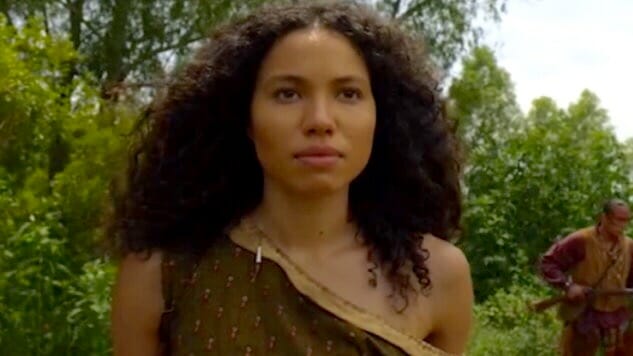No Church in the Wild: Christianity Comes to Underground in “Troubled Water”
(Episode 1.06)

Here is what I would like for you to know: In America, it is traditional to destroy the black body – it is heritage… There is no uplifting way to say this. I have no praise anthems, nor old Negro spirituals. The spirit and the soul are the body and brain, which are destructible – that is precisely why they are so precious. And the soul did not escape. The spirit did not steal away on gospel wings. The soul was the body that fed the tobacco, and the spirit was the blood that watered the cotton, and these created the first fruits of the American garden.—Ta-Nehisi Coates, author, MacArthur genius, atheist
![]()
What do we do with the God of the people who legally owned our ancestors? Early on in Underground Noah confidently stated that, if there is a God, “he’s not on our side,” and that fact seemed abundantly clear. It’s not going to be a God—and certainly not the same that God white slaveowners worshipped—who gets them to freedom. It’s going to be the coming together of flesh and blood, in the name of freedom.
Underground is no longer dancing around the question of the relationship between black Americans, liberation and Christianity. “Troubled Water” introduces a new villainous character in the way of the Reverend Willowset (Wayne Pére), who comes armed with an especially dangerous tool for black Americans living under the oppression of whites: Christianity. Underground has shown some brutal scenes, but instead of bombarding us with images of black men and women being beaten to within an inch of their life, the psychological warfare of slavery often takes precedence on the show. Every character on Underground is unique, but is also informed by his or her particular upbringing in slavery. Cato has been scarred, and behaves as such. Rosalee has been sheltered, and behaves as such. They all deviate from our expectations at one point or another (Rosalee does so in a huge way, this week), but Noah probably stands out as one who has worked to maintain his true self, even under bondage. Perhaps this is because, in the same way that he never believed himself to be a slave, he never believed there to be a God who would save him.
This week, we’re forced to face the issue of Christianity as a means of psychological warfare. I know in saying this, I’ve already alienated some readers—and it won’t help to tell you that I grew up in the church (Baptist), that I accepted Christ as my personal savior when I was 14, or that this is my absolute favorite internet meme of all time. The truth is, I no longer worship the Christian God, and the history behind what unfolds in “Troubled Water” is one of many reasons why.
I can’t think of a more brilliant way to keep an oppressed people oppressed, than to tell them that their suffering brings them closer to a God. I can’t think of a better lie to tell a group of enslaved people, than one that declares that their lives on earth do not matter, because their true reward is in the afterlife. Freedom comes to those who obey their masters; freedom comes to those with the divine patience to wait for a better life in heaven. Black lives don’t have to matter on Earth, because God is the one true judge and the meek shall inherit the Earth… and so on, and so forth—all of the things our ancestors were taught by the same men and women who legally owned them.
-

-

-

-

-

-

-

-

-

-

-

-

-

-

-

-

-

-

-

-

-

-

-

-

-

-

-

-

-

-

-

-

-

-

-

-

-

-

-

-









































